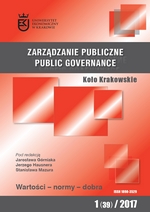A trap of evaluating or a trap of a strong subjectivity. A reply to Piotr Augustyniak’s lecture
On Heidegger’s and Nietzsche’s critiques of values and their positive outcomes
DOI:
https://doi.org/10.15678/ZP.2017.39.1.02Keywords:
Martin Heidegger, Friedrich Nietzsche, philosophy, ethics, valuesAbstract
The paper is a reply to a lecture given by Piotr Augustyniak, devoted to Heideggerian-Nietzschean critiques of values, or rather critiques of thinking based on values. The main problem of thinking based on values is that it puts in the centre the domination of a strong subject over that which he or she values. The aim of the paper is, firstly, to describe the nature of the critiques of thinking based on values according to their two aspects: (1) questioning of the ethical character of the concept of value because of its economics-related meaning and origins, and (2) exposing of the problematic ontological status of ethical values. Secondly, the author points out a possible solution, a potential alternative concept of subjectivity, other than the traditional Cartesian one. The research method is based on a reconstruction of the arguments of the two German philosophers and on the alternative concept of subjectivity formulated by Heidegger. This subjectivity, founded in temporality, which is basically the essence of the human mode of being, does not establish itself as an advantage of a human over being, but rather as a proper understanding of one’s own and somebody else’s being, which we do not evaluate but we let it exist.



